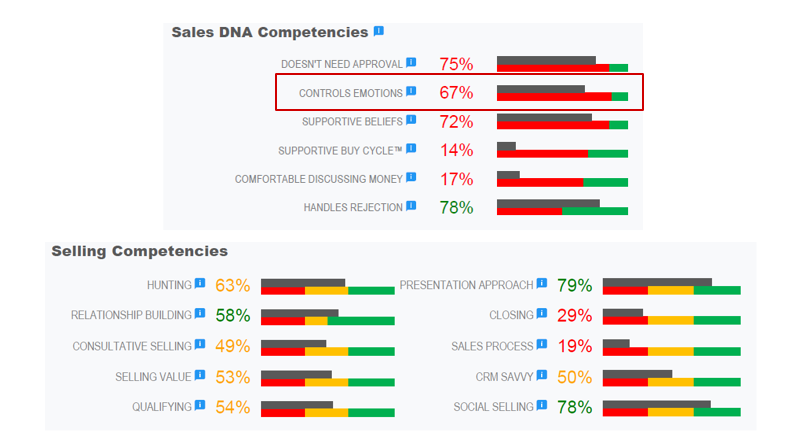Feedback and the Sales Person
/By Michael Lang
The Scene:
We evaluated a sales team recently which included new and experienced salespeople.
The Challenge:
When a company is not growing, the ability to get below the surface and understand more about what needs to change is often left out by sales leaders.
What is needed is a road-map which consists of training, coaching systems, processes and sales leadership.
Invariably, like any team environment, there are some people hitting targets, some middle of the road and some below average.
How the team members are measured in terms of their performance varies from company to company.
Performance is traditionally measured by revenue generation. This can be deceptive.
Below is an excellent example of why what you measure matters:
We reviewed the sales team analysis data with the owner of the business; he was surprised and pushed back on a experienced salesperson finding.
He asked, "how is it that you have found these weaknesses in one of my best salespeople?"
When we asked what he meant by this, he replied: "he hits his numbers".
Digging deeper, several of the companies key sales team issues included:
Not winning enough new clients
Poor cross-selling
Consistent discounting
Taking progressively longer to get deals over the line
Not enough opportunities in the pipeline to compensate for the lack of deals
With this in mind, we explained the reasoning behind our findings and suggested he push through with the plan of action and watch what happens.
This is not the first time we have had this type of push-back here after assisting companies to grow.
When the experienced salesperson received his evaluation feedback:
When the experienced salesperson received his evaluation as part of the self-awareness stage, his response was an emotive email.
The owner shared this email with us:
“Just saw my scores, pure nonsense, I'm a top producing sales person, have been for the last 50 years and will be in the future. I'm insulted and deflated by the evaluation.
Since I'm held in such low esteem, as per your discussion with Bob. I feel it would be beneficial for all if I resign. Effectively immediately.“
Remember the owner's initial push-back when we presented our findings?
It’s apparent that the evaluation findings are entirely in line with what I might expect from someone who has been selling since the 60's.
Here is why:
He's best at relationship building, selling value and presenting.
He hasn't learned the sales process, consultative selling, using a CRM or Social Platforms because he never had to in the past.
He has relied on his past contacts to sell every year.
On the Sales DNA score, it's kind of what we'd expect from someone who sells for this type of company.
Experienced Salesperson’s Sales DNA Score
When you consider the assessment data against the stated main business driver, I asked the owner: "Does what you see here provide you with the growth you are requiring?"
The experienced salesperson brought his scores to life with his email.
His Commitment score was 0. It doesn't get any lower than that. He was in the red for Needs Approval and Rejection. After completing the assessment and being challenged, he resigned.
Based on 29 years of evaluating nearly 2 million people with our assessment tool, we believe he would have resigned or moved to another company at some point this year.
This is because accountability within the company has increased and he would have used the excuse that "things were changing for the worse."
We received a call from the owner stating he was happy the salesperson had resigned as he was making excuses and openly criticising everything in the company.
The Lesson:
When you rely on purely a subjective framework, you miss all the opportunities for growth.
Jim Collins, Good to Great fame, says, "you need to face the brutal truth".
Having an objective perspective of your sale teams capabilities allows you to make informed decisions about:
Sales strategy: does it need refining? Is it understood by everyone?
Sales messaging: does it need rewording and embedded differently?
The type of training: Do your salespeople and leaders require ongoing coaching?
Systems and processes: Do they need tweaking?
Sales management: Does management need to change around their coaching and accountability of the team?
Sales recruitment: Does the sales hiring process need refining?



